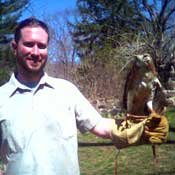Since the BP Deepwater Horizon oil rig exploded in the Gulf of Mexico April 20, the entire Gulf Coast region has experienced environmental threats to human and animal populations. Many organizations and individuals have stepped up to help in the cleanup efforts. Among them is Sean Saville, the National Audubon Society's national field director, who is supervising bird clean-up efforts along the Coast for the society.
Saville, 35, who is from Washington, D.C., is helping train volunteers for oil spill. The National Audubon Society began deploying staff and volunteers to the affected areas soon after to assist in the rescue and transportation of birds that came into contact with oil.
"We don't know what the true impacts of the oil spill are, and we won't know them in the short term," Saville says. "The volunteers that are responding to this crisis can affect the health of the region for generations to come. Through long-term conservation and restoration--which is crucial to birds, ecosystems- and all the coastal communities--we anticipate being able to have a positive effect on the environment in the long run through our activities now."
Saville, who earned his bachelor's degree in environmental conservation from the University of Colorado at Boulder, relocated from The National Audubon Society in Washington D.C., in May to oversee The Audubon Volunteer Response Center in Moss Point. As field director, Saville makes visits to all four coastal states affected by the spill--Louisiana, Mississippi, Alabama, and Florida--and directs the staff at the volunteer center.
"One of the challenges I face on the job is managing a wide range of job responsibilities in a timely manner. Luckily, we have very capable staff in place--a lot of talented people here at the center and a lot of good volunteers out on the ground. All of these make my job seem a bit easier, and it's really helping Audubon to be associated with such great people." Saville says.
Since coming to Moss Point, Saville has spent most of his 12-hour workdays overseeing the six volunteer projects that his organization identified. With more than 17, 000 volunteers applying nationwide through an online database, Saville and his staff spend a great deal of time selecting volunteers and training them.
One of the volunteer projects is the coastal bird survey, a program consisting of 30 volunteers to collect data, photograph and observe changes in bird population .The other volunteer projects include: wildlife transport facilitators, bird capture and rescue materials, citizen science monitoring, and bird hotline operators. The Audubon Volunteer Response Center also has several staff openings for scheduling and selecting volunteers, office management, and trainers for newly selected volunteers available through their volunteer response center staffing division. Saville says training sessions for new volunteers aren't very time consuming, ranging 20 minutes to six hours, depending on the areas volunteers will be assigned to work in.
Saville encourages everyone 18 and older to apply and assist in coastal cleanup efforts. Although the initial need for volunteers was lower than expected, Saville still advises anyone who wants to volunteer to apply in advance for future opportunities. The National Audubon Society will attempt to work in the coastal states throughout the entire duration of the crisis. To volunteer, go to National Audubon Society's website to complete a volunteer registration form.



Comments
Use the comment form below to begin a discussion about this content.